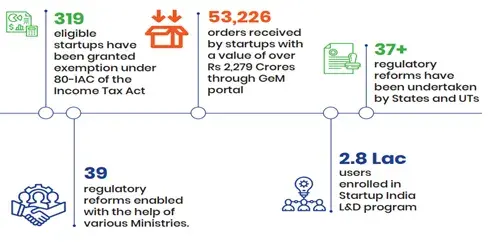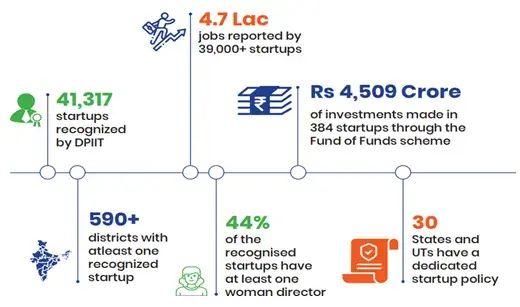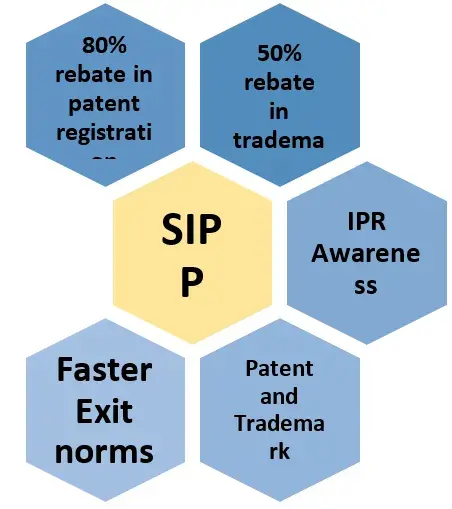“Never dream of becoming something, if you dream, dream of doing something.”…PM Narendra Modi
In India, the Start-up Initiative was envisioned by Prime Minister, Narendra Modi during his speech on August 15, 2015, and subsequently was launched on January 16, 2016. Since the inception of the initiative, start-ups in India have flourished and these innovative, adaptive and technology-driven entities have made their imprint in the Indian economy. The same was duly acknowledged by PM Modi recently when he remarked that the start-ups have changed the demographic character of India and that while the world struggled, an army of start-ups came up in India during the COVID-19 pandemic. According to statistics at present, there are 45,107 Department for Promotion of Industry and Internal Trade (DPIIT) recognized start-ups in India[1].
START-UP INDIA IN NUMBERS[2]
From January 2016-December 2020


Start-Ups in the Indian Food Industry: The Rise of Alternative Protein Innovation
The advent of technological advancement and subsequent penetration of the internet in India, has led to mushrooming of food tech start-ups in India. The COVID-19 pandemic further catalysed the expansion of this sector in India. As a result, food tech start-ups have emerged as one of the most viable platforms for food and grocery delivery services in India. A report by the DigitalFoodLab[3], indicates an increase in investments in food tech start-ups in India. Similarly, the Indian Food processing industry is also growing by leaps and bounds and Indian Food start-ups are playing an instrumental role in transforming the whole food industry landscape in India.
Innovation in food Technology and Evolution of Smart Protein
Smart protein is an emerging innovation in food technology that addresses multiple concerns ranging from sustainability, consumer demand for protein, animal welfare, food security, etc. Since 2015, more than thirty-five companies have emerged in the smart protein sector in India. ‘Smart protein’ also known as ‘alternative protein’ are products which can reliably and predictably substitute animal derived meat, eggs and dairy by replicating the sensorial and organoleptic properties of traditional meat, eggs and dairy. [4] Innovators create these products directly from plants, cells or microorganisms.[5] The products fall under three main categories:
- Plant-based Protein- Plant-based protein meat, eggs and dairy products where the proteins are derived from plant sources such as the Impossible Burger, Beyond Burger or plant-based chicken nugget or peanut curd in India.
- Cultivated Protein- Cultivated protein products are produced by cultivating a sample of animal cells and bypassing the raising and slaughtering of animals to produce meat and meat products. Cultivated Meat is also known as ‘cultured’, cell-based’, and clean meat in other countries.
- Fermentation derived protein- Fermentation derived foods such as dahi, idly, yoghurt are not new to India, but proteins that are derived from biomass fermentation or precision fermentation is a relatively novel process that is currently emerging in India.
The growing innovation in the alternative protein industry is attracting financial growth and investor support in India and worldwide. Due to this growing interest, there is a great potential for individuals and companies looking to invest their resources, time and effort in alternative protein. Due to the vast financial investments and innovative efforts in this relatively new industry, there are various Intellectual Property Rights considerations and how they can be protected.
SIPP SCHEME AND IPR BENEFITS FOR START-UPS IN INDIA
Startups Intellectual Property Protection (commonly known as SIPP) aims to promote awareness and adoption of Intellectual Property Rights amongst start-ups. This Scheme is inclined to nurture and mentor innovative and emerging technologies among startups and assist them in protecting and commercialising it by providing them access to high quality IP services and resources[6]. The Start-Up Action Plan released on January 16, 2016 envisaged several benefits for start-ups in India and one such benefit was the IPR benefits and facilitation for start-ups in India.

Hence, one of the action points was to promote awareness and adoption of IPRs by start-ups and facilitate them in protecting and commercialising the IPRs by providing access to high-quality intellectual property services & resources, including fast-track examination of patent applications and rebate in fees.
IPR Benefits for Start-Ups in 5 years- in numbers
A booklet released by the Government capturing the 5-year story of start-ups in India reports that there has been an 87% increase in IPR registrations by Start-Ups over a period of 3 years (2017-2020).
It also provides that[7]:
- 5,020 patent applications have been filed
- 1,170 patent applications filed for expedited examination by start-ups; of these 884 applications have been examined and 459 patents have been granted
- 12,264 trademark applications have been filed
- 510 patents and designs facilitators and 392 trademarks facilitators empanelled under the sipp scheme.
Start-Up Registration for availing IPR Benefits
In order to claim benefits under the SIPP Scheme it is mandatory for the start-up applicant to possess Certificate of Recognition from DPIIT (earlier DIPP). The Certificate of Recognition shall be submitted with the Indian Patent Office (IPO) at the time of filing patent, design or trademark application[8].
Empanelment of IP Facilitators
Prior to the introduction of the SIPP Scheme and subsequent empanelment of IPR Facilitators under the Scheme, the start-ups often suffered from inadequate guidance from lawyers and agents who were not proficient in IP laws and drafting of patent applications. However, after the appointment of IPR Facilitators for effective implementation of the Scheme, the start-ups can take assistance of qualified IPR professionals for filing and prosecution of their IPRs and they also do not have to pay any fee to the IP Facilitator, as they are paid nominal professional fee directly by the Government through the office of the Office of the Controller General of Patents, Design and Trademarks (CGPDTM). However, official/statutory fee for filing patent, trademark and design application shall be borne by the start-up itself.
IPR Benefits for Start-Ups[9]
- Reduction in cost in IP filings-There is 80% reduction in the cost of filing patents in India. Patent and Design application filed under start-up category (DPIIT recognized) i.e. start-up as the applicant, the applicant has to bear only the official fee/statutory fee incurred for filing patent and design application with the Indian Patent Office till registration of the design. No professional charges are required to be paid. The government will bear all facilitator fees.
- Fast-tracking of patent applications is possible by filing a “Request for Expedited Examination” which mandates the Controller to issue the First Examination Report (FER) within 105 days when the expedited examination request is accepted. Granting of patents is expedited and reduced to less than a year from five to seven years.
- Easy Access to funds: The government has set up a ₹ 10,000 crore fund to the start-ups as venture capital. The government is also giving guarantee to the lenders to encourage banks and other financial institutions for providing venture capital.
- Tax exemption: Start-ups will be exempted from income tax for 3 (three) years subject to providing certification from Inter-Ministerial Board (IMB).
- Relaxation in public procurement norms: A DPIIT registered start-up may bid for government contracts with fewer eligibility requirements. They are exempted from the “prior experience/turnover” criteria applicable for normal companies answering to government tenders. That is a start-up can avail exemptions on Earnest Money Deposit (EMD); prior turnover and experience which are generally required while applying for government tenders.
- Self-certification: Any private limited company, per law, is ordinarily bound by labour and employment laws and therefore, officers are required to inspect the company concerning the registration of establishments, maintenance of establishment in terms of safety norms, compliance with employee beneficial norms like payment of gratuity, and insurance cover. However, start-ups are allowed to self-certify their compliance under six labour laws and three environment laws. This benefit is allowed for five years from the date of incorporation of the entity and is given to reduce the regulatory burden for start-ups so that they can focus on their core business and keep compliance costs low.
- Easy Winding Up of Company: Start-ups also known as fast track firms can be wound up within 90 days as against 180 days for other companies
Undeniably, the food start-ups sector in India is all set to witness unprecedented growth and huge investments await their way. However, this sector booming with ideas and concepts shall take cautious steps in protecting their ideas and statutorily protect their Intellectual Property Rights. The Indian Government under the start-up India initiative is taking several steps to make the ecosystem more conducive for filing and protection of IPRs by start-ups and figures indicating an increase in IPR filing by start-ups is a testimony to the same.
[1] https://www.startupindia.gov.in/
[3] https://www.digitalfoodlab.com/foodtech-in-india/
[4] The Good Food Institute India
[5] https://gfi.org/advancing-solutions-for-alternative-proteins/
[6] https://ipindia.gov.in/writereaddata/Portal/News/323_1_Scheme_for_facilitating_start-ups.pdf
[7] ibid
[8] The Trademark Rules, 2017 provides that an entity fulfilling the criteria of a startup shall provide a declaration to that effect. The Rules can be accessed here- https://ipindia.gov.in/TM-Rules-2017.htm
[9] https://www.startupindia.gov.in/content/sih/en/startup-scheme.html
For more information regarding benefits for Start-ups for building an IPR portfolio, please write to us at: info@ssrana.com
Related Posts


